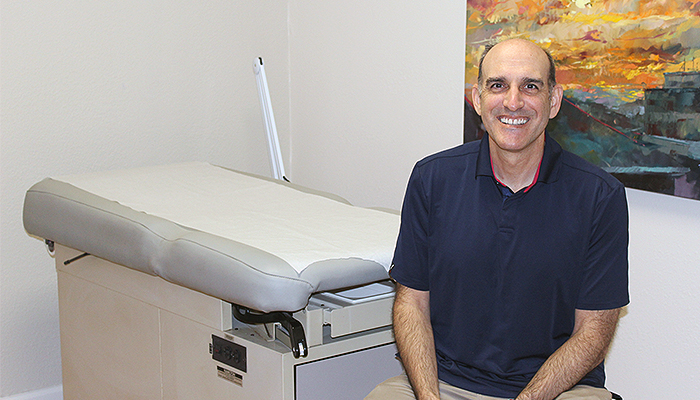By CRISTINA JANNEY
Hays Post
Avalon Advanced Health is providing a new health care model in Hays — direct primary care.
Dr. Marshall Eidenberg’s practice does not bill third-party insurance.

Instead, patients pay a monthly fee for services some of which include sick visits, weight management, house calls, pre-operation visits, in-office ultra sound, sports physicals, diabetes management, and pediatric sick visits and well checks.
By eliminating its back office staff, Dr. Eidenberg is able to provide services less expensively and more efficiently. He said 90 percent of services are covered under the monthly service fee, which starts at $75 for an individual. Per-person prices decrease for family memberships.
Eidenberg is the former director of the ER department at HaysMed. His medical background includes 12 years in the Army as an emergency medical physician. During that time he also worked in population health and preventive medicine. He also spent four years at Via Christ in Wichita in its ER department.
During his time as an ER physician, he learned the value of preventive care. He said he appreciates being able to spend more time with his patients in his new practice.
Whereas a visit to a physician in a typical clinic might last 20 minutes, appointments at Avalon can be 30 to 90 minutes. This time allows him the opportunity to counsel and educate and decrease patients’ need for medicines. In a fee-for-service model, clinics and doctors make more money if they see more patients and perform more procedures, Eidenberg said.
“By having the time and answering all the questions, making a comprehensive plan with the patient, we actually save them time because then they don’t have to make that appointment next month to come back in and pay another co-pay for the office visit,” he said. “We believe in the value of the comprehensive visit.”
The practice has on-site lab services. Eidenberg can draw labs at the beginning of the appointment and have results back before the patient leaves the office.
Eidenberg recommends patients still keep major medical insurance, but most direct primary care patients can increase their deductibles and save money. His family moved to a higher deductible and is saving $400 to $500 per month.
He said his experiences in the ER lead him to think there was a more efficient way to provide health care.
“I was the chief of the ER here at HaysMed, and we had no clue of what was being billed in our name. We were being given just a salary. My wife was injured and ended up going into the ER,” he said. “We had very good insurance, and there was still a $1,000 co-pay. Just from there, we figured there had to be a better way. Health care does not need to cost as much as it does.”
Of the 30 heads of the Blue Cross and Blue Shield organizations, they made more than $100 million in 2016, Eidenberg said.
“That didn’t keep anybody’s rates down. In fact, most people saw an increase in their insurance rates,” he said.
Eidenberg compared health insurance to car insurance. Direct primary care takes care of the day-to-day needs of patients like changing the oil in a car, and health insurance is saved for major occurrences we hope never happen like heart attacks.
Eidenberg offers after-hours care, which can save costly trips to the ER for conditions that would normally be dealt with in a clinic setting.
“If you are a mother at 2 in the morning with three kids and one of them is sick, do you want to package everyone up at 2 in the morning to go to the ER?” he said. “We can make house calls and save that mother the time and effort and the cost. The ER is allowed to charge an after-hours fee, and believe me they do. I think we are an option for everybody if you want that personalized care.”
By providing easy access to primary care, Eidenberg said he hopes to free the ER to care for true emergencies.
The practice tries to limit specialist referrals by trying to have minor questions about ongoing care answered electronically through email. The practice also tries to save time and money when referring to a specialist by contacting the specialists about labs and studies that need to be done. Those labs can be done in advance. This allows the specialist to address issues in a single visit.
The practice also works with employers to perform site visits to identify instances in which an employee might be injured.
The clinic, 2703 Hall, Ste. 13, opened in April. Eidenberg said he has had good response from the community, including clients from the hospital.
He said he sees direct primary care as a growing trend. There are more than 1,000 practices across the country, although few at present in the state of Kansas.
